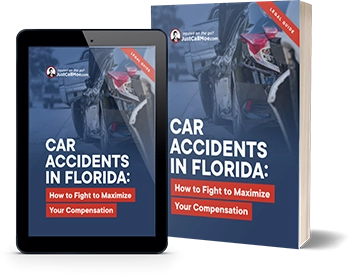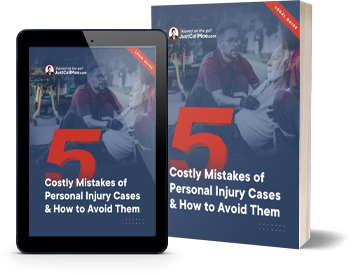When you hear the term “black box,” your mind likely jumps to the aviation industry, where these devices are used to record critical flight data. However, many people do not realize that nearly all modern cars also contain a similar device known as an event data recorder (EDR). This car black box can provide invaluable evidence when investigating car accidents, as our experienced Winter Haven car accident lawyers at JustCallMoe explore.
What Is a Black Box in a Car?
An event data recorder, more commonly known as a black box, is a small device installed in most cars manufactured after 2014. Much like the black boxes used in airplanes, car black boxes record vital data about a vehicle’s operation and performance. The primary purpose of these devices is to monitor and record information related to car accidents or collisions. They are typically triggered by a crash or sudden change in velocity and capture data in the seconds before, during, and after an incident. EDRs are usually located under the driver’s seat or in the center console and are built to withstand severe impacts and extreme temperatures. While their presence is not always obvious, these devices play a crucial role in understanding what happens during a crash.
Data Recorded by a Black Box in Cars
While the specific data collected can vary depending on the make and model of the vehicle, most automotive black boxes record information such as:
- Vehicle speed
- Acceleration and deceleration
- Steering angle
- Brake application and force
- Seatbelt usage
- Airbag deployment
Some more advanced systems may also capture data from additional sensors like GPS location, engine RPM, and even driver inputs like turn signal usage. It is worth noting that black boxes do not continuously record data. Instead, they typically operate on a loop, constantly overwriting old data until a triggering event, like a collision, occurs. At that point, the device saves the data from a brief period before, during, and after the event.
Accessing Black Box Data
Retrieving data from a car’s black box requires specialized equipment and software. In most cases, this process must be performed by trained technicians, often at the request of law enforcement or legal professionals. It is important to note that while vehicle owners have some rights regarding the data collected by their car’s EDR, laws vary by state. In many cases, car manufacturers, law enforcement, and other authorized parties may access this data without the owner’s explicit consent, especially in the context of an accident investigation.
Accessing black box data often involves connecting a diagnostic tool to the vehicle’s onboard diagnostics (OBD) port. This allows technicians to download the stored data for analysis. In some cases, the physical removal of the black box may be necessary, particularly if the vehicle has been severely damaged.
The Role of Black Box Data in Accident Investigations
The objective data provided by black boxes in cars can be crucial in piecing together the events leading up to a crash and determining fault. By analyzing factors like speed, braking, and steering inputs, investigators can often recreate a detailed timeline of an accident. This information can be particularly valuable in cases where eyewitness accounts are unavailable, conflicting, or unreliable.
Black box data provides an unbiased, factual record of a vehicle’s actions and can help resolve disputes about how an accident occurred.
For example, if one driver claims they had the right of way, but the black box data shows they were speeding and did not apply their brakes before the collision, this could be strong evidence of their negligence and liability. Black box data can also shed light on factors that may have contributed to an accident, such as sudden acceleration or brake failure. This information can be essential in identifying potential vehicle defects and holding manufacturers accountable.
Legal Implications of Black Box Evidence
In legal proceedings related to car accidents, black box data is generally admissible as evidence, provided it is collected and handled properly. This means following established protocols for data retrieval, preservation, and analysis. Attorneys may use black box evidence to support their client’s claims, refute false allegations, or demonstrate the severity of an accident and resulting injuries. In some cases, this data can be the deciding factor in determining fault and awarding damages.
However, it is crucial to remember that while black box data is valuable, it is not infallible. The devices themselves can malfunction, and the data they record may require expert interpretation to be properly understood and applied in a legal context. Additionally, there are ongoing debates about privacy concerns related to black box data. Some argue that the information collected by these devices should be protected under privacy laws, while others maintain that the public safety benefits outweigh individual privacy interests.
The Future of Black Box Technology
As vehicle technology advances, so will the capabilities of automotive black boxes. Many experts predict these devices will become even more sophisticated, recording a wider range of data points and potentially even incorporating video footage. There are also ongoing discussions about standardizing EDR technology across all vehicle makes and models and creating clearer legal guidelines for the collection and use of black box data. As our cars become increasingly connected and autonomous, the role of black boxes in accident investigations and legal proceedings will likely only continue to grow.
Some manufacturers are already exploring ways to leverage black box data for purposes beyond accident investigations. For example, this information could be used to improve vehicle safety features, optimize insurance rates based on driving behavior, or even help cities plan safer road infrastructure.
You Can Count on Our Legal Help
Automotive black boxes, or event data recorders, have become an essential tool in modern car accident investigations. Through providing objective, detailed data about a vehicle’s actions before, during, and after a crash, these devices can help determine fault, support legal claims, and ultimately lead to more just outcomes for those involved. If you have been involved in a car accident, do not hesitate to reach out to the experienced legal team at JustCallMoe. We have the knowledge and resources to thoroughly investigate your case, including leveraging the power of black box data, and fight for the compensation you deserve.

 (866) 225-5663
(866) 225-5663



